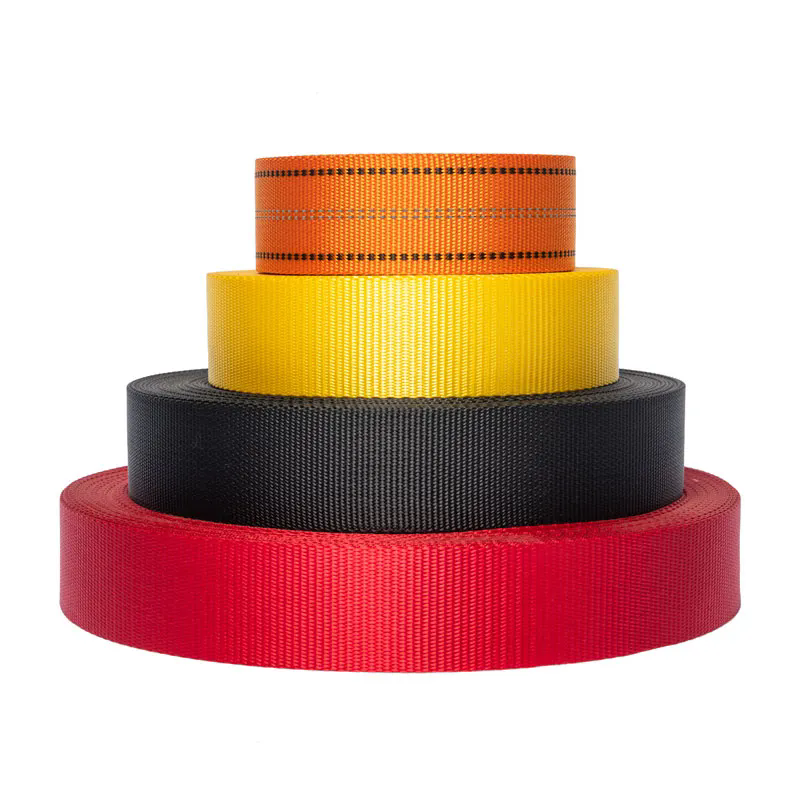Why Is Polyester Webbing the Go-To Choice for Strength and Durability?
2024-12-06
Polyester webbing is a versatile and durable material that has become an essential component in various industries, from outdoor gear and transportation to fashion and home use. But why has it earned such a reputation as the go-to choice for strength, reliability, and longevity? In this blog, we’ll explore the many reasons why polyester webbing stands out in the world of textiles, its broad range of applications, and the benefits it offers over other materials.
What Is Polyester Webbing?
Polyester webbing is a type of woven fabric made from polyester fibers, which are known for their exceptional strength and resilience. This webbing comes in a variety of widths, thicknesses, and patterns, making it incredibly versatile. It’s often used for straps, belts, tie-downs, and other applications where high tensile strength is required.
Due to its durable and resistant nature, polyester webbing is a popular material in the manufacture of outdoor products like backpacks, seatbelts, and camping gear, as well as in industrial applications like lifting slings and cargo ties. The combination of affordability, strength, and resistance to various environmental factors makes polyester webbing a preferred choice for both commercial and recreational use.
Why Is Polyester Webbing So Strong and Durable?
One of the primary reasons for polyester webbing’s widespread popularity is its inherent strength. Here are some of the key factors that make it such a durable material:
- High Tensile Strength: Polyester fibers are known for their strong tensile properties, meaning they can withstand significant force without breaking. This makes polyester webbing perfect for heavy-duty applications, such as load-bearing straps in transportation or as safety features like seatbelts.
- Resistant to UV Rays: Polyester has an inherent resistance to ultraviolet (UV) light, which means polyester webbing won’t degrade or weaken when exposed to sunlight. This UV resistance makes it ideal for outdoor products that will be exposed to harsh sunlight over extended periods.
- Water-Resistant: Unlike some natural fibers, polyester doesn’t absorb water, which prevents it from getting heavy or soggy when exposed to rain or moisture. This water-resistant quality ensures polyester webbing remains strong and functional in all weather conditions.
- Abrasion-Resistant: Polyester webbing is resistant to wear and tear, even under high levels of friction. This makes it ideal for use in environments where constant movement or contact with rough surfaces could cause other materials to degrade quickly.
What Are the Key Benefits of Using Polyester Webbing?
Polyester webbing offers a number of advantages that make it a top choice for manufacturers and consumers alike:
- Longevity: The durability of polyester webbing means that it can be used for many years without losing its strength or integrity. This makes it a cost-effective choice for products that need to withstand long-term use, such as luggage straps or safety harnesses.
- Lightweight Yet Strong: While polyester webbing is incredibly strong, it is also relatively lightweight. This makes it easy to handle and use in various applications, from camping gear to cargo management, without adding unnecessary weight.
- Affordable: Compared to other materials like nylon or leather, polyester webbing is relatively inexpensive. This affordability makes it a popular choice for both industrial and recreational products that require strength but need to keep costs down.
- Versatility: Polyester webbing can be manufactured in various thicknesses and widths, making it suitable for a wide range of uses. It can be dyed in almost any color and is easily customized with patterns, logos, or text, making it ideal for both functional and aesthetic purposes.
How Is Polyester Webbing Used Across Different Industries?
Polyester webbing’s exceptional properties make it indispensable across several industries. Here are just a few ways it is commonly used:
- Outdoor Gear and Sporting Equipment: Polyester webbing is often found in backpacks, tents, sleeping bags, and other outdoor gear. It’s also used in safety equipment like climbing harnesses and rope systems, where strength and durability are critical.
- Automotive and Transportation: Polyester webbing is commonly used in seatbelts, tie-downs, and cargo straps. Its ability to handle heavy loads and resist wear and tear makes it an ideal material for securing goods during transportation or ensuring passenger safety.
- Fashion and Apparel: In the fashion world, polyester webbing is used for belts, straps, and bag handles. Its strength and ability to maintain its shape make it a popular choice in products that require both durability and style.
- Industrial and Commercial Use: Polyester webbing is often used in lifting slings, hoisting equipment, and securing materials. In industries like construction and logistics, its strength and ability to withstand extreme conditions make it a trusted material for heavy-duty applications.
- Military and Tactical Gear: In military and tactical applications, polyester webbing is used for things like rifle slings, pouches, and belts. Its high strength-to-weight ratio and resistance to environmental factors make it an ideal material for these demanding settings.
How Does Polyester Webbing Compare to Other Materials?
While polyester webbing has numerous advantages, it’s helpful to understand how it stacks up against other materials, particularly nylon, which is another common option for webbing.
- Polyester vs. Nylon: While nylon webbing is generally stronger and more elastic than polyester, it is also more prone to degradation from UV exposure. Polyester webbing, in contrast, has superior resistance to UV rays and is less likely to lose its strength when exposed to sunlight. This makes polyester a better choice for outdoor applications.
- Polyester vs. Natural Fibers: Compared to natural fibers like cotton or hemp, polyester webbing is far more durable, water-resistant, and resistant to mildew or rot. It is also lighter and more affordable, making it a more reliable option for heavy-duty use.
Conclusion: Why Choose Polyester Webbing?
Polyester webbing stands out as a material that combines strength, durability, versatility, and affordability. Its resistance to UV rays, water, and abrasion makes it a top choice for both industrial and consumer applications, ensuring long-lasting performance in even the most demanding environments. Whether you're creating outdoor gear, securing cargo, or designing fashion accessories, polyester webbing provides the reliability and performance you need. Its combination of properties ensures that it will continue to be a staple in various industries for years to come.



